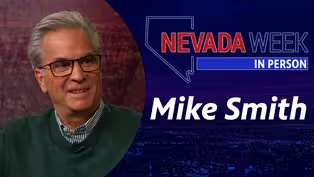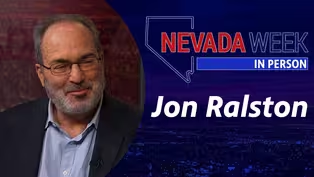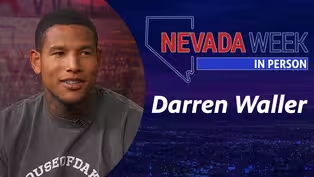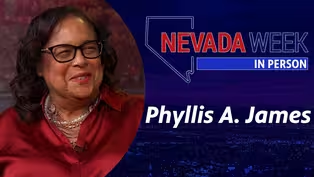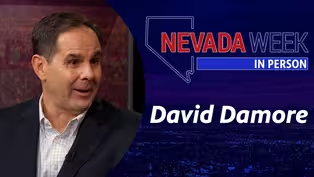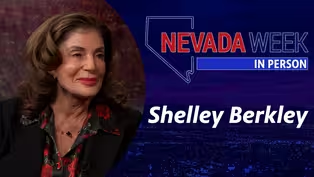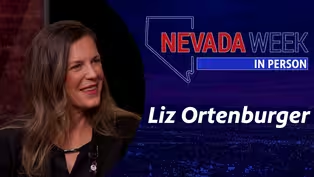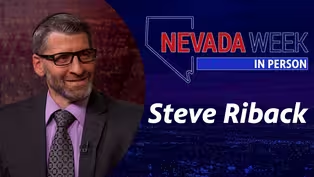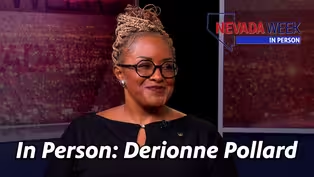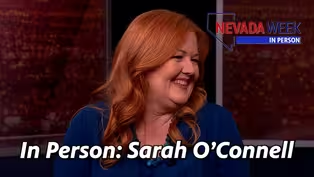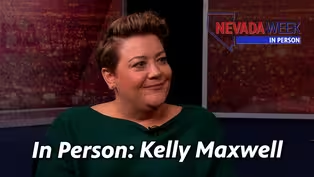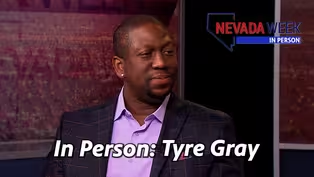
Nevada Week In Person | Beverly Rogers
Season 1 Episode 53 | 14mVideo has Closed Captions
One-on-one interview with Rogers Foundation chair Beverly Rogers.
One-on-one interview with Rogers Foundation chair Beverly Rogers.
Problems playing video? | Closed Captioning Feedback
Problems playing video? | Closed Captioning Feedback
Nevada Week In Person is a local public television program presented by Vegas PBS

Nevada Week In Person | Beverly Rogers
Season 1 Episode 53 | 14mVideo has Closed Captions
One-on-one interview with Rogers Foundation chair Beverly Rogers.
Problems playing video? | Closed Captioning Feedback
How to Watch Nevada Week In Person
Nevada Week In Person is available to stream on pbs.org and the free PBS App, available on iPhone, Apple TV, Android TV, Android smartphones, Amazon Fire TV, Amazon Fire Tablet, Roku, Samsung Smart TV, and Vizio.
Providing Support for PBS.org
Learn Moreabout PBS online sponsorshipMore from This Collection
Nevada Week In Person goes beyond the roundtable discussion of Nevada Week with guests for a more casual conversation about their personal passions, new projects and compelling stories that are overlooked in the flurry of the news cycle.
Nevada Week In Person | Mike Smith
Video has Closed Captions
One-on-one interview with Las Vegas Sun political cartoonist Mike Smith. (14m)
Nevada Week In Person | Jon Ralston
Video has Closed Captions
One-on-one interview with The Nevada Independent CEO Jon Ralston. (14m)
Nevada Week In Person | Darren Waller
Video has Closed Captions
One-on-one interview with Las Vegas Raider tight end Darren Waller. (14m)
Nevada Week In Person | Phyllis A. James
Video has Closed Captions
One-on-one interview Phyllis A. James. (14m)
Nevada Week In Person | David Damore
Video has Closed Captions
One-on-one interview with Chair of the Department of Political Science at UNLV David Damor (14m)
Nevada Week In Person | Shelley Berkley
Video has Closed Captions
One-on-one interview Senior Vice President for Touro University Shelley Berkley. (14m)
Nevada Week In Person | Liz Ortenburger
Video has Closed Captions
One-on-one interview with SafeNest CEO Liz Ortenburger. (14m)
Nevada Week In Person | Steve Riback
Video has Closed Captions
One-on-one interview with Las Vegas Metro Police Lieutenant Steve Riback. (14m)
Nevada Week In Person | DeRionne Pollard
Video has Closed Captions
One-on-one interview Nevada State College President DeRionne Pollard. (14m)
Nevada Week In Person | Sarah O’Connell
Video has Closed Captions
One-on-one interview with Director of Eat More Art LLC Sarah O’Connell. (14m)
Nevada Week In Person | Kelly Maxwell
Video has Closed Captions
One-on-one interview with Baby’s Bounty Executive Director Kelly Maxwell. (14m)
Nevada Week In Person | Tyre Gray
Video has Closed Captions
One-on-one interview with Nevada Mining Association President Tyre Gray. (14m 1s)
Providing Support for PBS.org
Learn Moreabout PBS online sponsorshipA philanthropist, bibliophile, and driving force in Nevada education and arts, Beverly Rogers, Chairman of the Rogers Foundation, joins us this week for Nevada Week In Person.
♪♪♪ Support for Nevada Week In Person is provided by Senator William H. Hernstadt.
Welcome to Nevada Week In Person.
I'm Amber Renee Dixon.
She moved to Southern Nevada in 1962.
And it was her family's experience here in those early years that sparked a lifelong passion for Las Vegas and its wellbeing.
Chairman of the Rogers Foundation, which reports giving more than $89 million to students and programs that support them, Beverly Rodgers, thank you for joining us for Nevada Week In Person.
-Thank you very much for having me.
-So I mentioned that you and your family moved here in the 60s from Pennsylvania, and what was it about the experience then that sparked that lifelong passion for Southern Nevada?
(Beverly Rogers) I have to say that my parents came to start over in life, and they brought nothing with them.
In fact, we came here because my brother and I were out of school for Christmas vacation.
We actually flew here on Christmas Day 1962.
And in the next two weeks, my parents got jobs and a place to live and put us in school and we never left.
And I-- What really made a difference that I look back on, certain things that happened, now more than I did at the time they were happening, but I could see that my-- I knew that my parents were starting over.
They really-- They didn't bring furniture.
They had nothing; they barely had the clothes on their backs.
They didn't have jobs, they didn't-- But they made friends very easily.
And they were both smart people, and they were able to-- They worked very hard.
They each worked two jobs.
They saw opportunity that Las Vegas became, at that time and I think still is, a place where people can come and find opportunity and that the town has an openness and a warmth that other places may have shut them out.
But they were able to make it, and they made it.
And that's inspirational to me.
-Oh, it's very inspirational.
Very neat.
So you went on to graduate from UNLV.
You went on to work in sales and marketing in television and radio.
Is that how you met your late husband, Jim Rogers, who owned Channel 3 here in town?
-That is.
I worked there for over a year.
I had worked for a couple of other-- for a couple of radio stations and a couple of other television stations.
I went to work at Channel 3.
I worked there for over a year.
One day I came back to the station-- I worked in sales, in commercial sales.
So I came back to the station, there's a message on my phone from Jim Rogers.
"Hi, this is Jim Rogers.
Will you call me?"
I ran into my supervisor's office and said, "Hey, Dick, there's a message on my phone from Jim Rogers.
Am I in trouble?"
He kind of had this look like, You're in trouble, but you don't know what kind.
Anyway, I just-- He said, No, you're not in trouble.
So I called, and he asked me out.
And I married the boss.
Long story short.
-I used to work for Jim Rogers, and a call from him could be kind of intimidating.
-Absolutely.
-That had to be different, a different kind of proposal.
So he was a lawyer, a businessman, a media mogul, owned several TV stations, Chancellor of the Nevada System of Higher Education, a philanthropist, did not shy away from speaking his mind.
How did he impact you?
-That last comment about-- I wish.
I wish I could be like that.
I aspire to be like that.
-To this day?
-Yes.
But yes, he-- I also had a penchant for-- His big thrust was leaving his money to education and students who might not otherwise have opportunity.
And actually, my love was for educational endeavors as well, alongside a couple of other smaller things.
And so we worked well together on that.
And how he influenced me was in so many just funny little remarks that he would make where other people might laugh it off, but he was serious.
And he was-- He was an inspiration.
-You miss his humor?
-Yeah.
-How much do you miss him?
How has your life changed without him?
-Well, that's a long-- That's a long answer.
But the short answer is, I keep him alive because there probably isn't a week at least that goes by that I don't bring up three or four expressions of his or tell somebody that, Well, this is the way my husband would have handled it.
Which people may get sick of hearing that, but it is-- Sometimes-- He was very to the point, and he could solve problems.
-As can you, and as you are.
So you both have that passion for education.
The Rogers Foundation does so so much.
One aspect of it is the Educate Nevada Now, which is a, quote, nonpartisan education policy organization, focused on ensuring that every Nevada child has access to a quality education.
And part of that is that you are funding initiatives to help get schools adequately funded in Nevada, schools that have been historically underfunded.
What are your ideas on how to appropriately fund education here?
-That requires another long answer.
On the short end, I think what's important for people to understand is that public schools need to be funded to the level that the resources they receive are fair, adequate, uniform.
I'm talking statewide.
I'm talking rural.
I'm talking local.
I'm talking both on the level of student funding and on the level of making each of the schools adequate and having the right-- equitable for all students, and having the right resources to bring the kids up, because-- I will mention this: We every year, we give out a lot of scholarships.
-Yes, you do.
And the application process is open right now.
-Yes, it is.
And I just want to tell you, I would like the audience to know how heartening an experience it is for those who just read the paper and read that we're, you know, 55th out of 50 states in terms of where we fall.
The kids who-- We take in hundreds and hundreds of applications.
We have several people read and vet them.
We ask for a lot of personal information: a lot of school information, how much they participated in things, what their goals are in the future, we asked them to write an essay.
We vet those, then we interview 60 to 80 kids, which is something a lot of people don't do when they're giving scholarships.
It is 15 minutes per person.
We do it boom, boom, boom, every day until we do them all.
All of us at the table cry in between our 15-minute things.
These kids want to change the world.
They are-- They are bright, they are resourceful, they are unbelievably smart, and it's nothing like what you would think by what you read in the paper.
And we have kids who we end up helping to go to schools who might qualify for Harvard, and they might even get a scholarship from Harvard, but it's not enough to cover everything.
So we can-- We can send kids to Harvard.
We can send kids to-- We have kids at Columbia and Villanova and Oklahoma and Michigan and Stanford and Berkeley and UCLA, and we have kids who are going to be veterinarians and policymakers and in government and in medicine.
And these kids are coming out of our public school system.
-Some might say, Well, Beverly, then obviously the system's working if you are meeting these-- -That's because the kids who are coming in are getting some help with their-- on the resources end.
And I'll give you an example of that kind of help: We have a group we support called CORE, and CORE offers-- it's a program that offers wraparound services for two generations.
So they also have programs that help the parents and the entire family with things like basic needs and helping the parents learn language, that kind of thing.
But for the kids themselves, they go through tutoring and mentoring and character building exercises.
They get involved in community service.
They're offered any kind of mental health needs.
These are the kinds of resources that help these kids make it.
-So the Rogers Foundation seeks to empower Nevadans through education but also through art.
Your latest project is The Beverly Theater, a 14,000 square foot film house and performance theater in downtown Las Vegas.
What did you think was the need for that?
-We don't have an art house independent theater in Las Vegas.
And this one will be, you know, relatively small, but we've built it to be able to do a lot of different kinds of things.
So you know, we'll have a literature focus with authors coming in doing readings.
We'll be working with The Writer's Block next door.
We'll have a film focus on a lot of fun things that I'm not even going to disclose right now.
And we'll have some live entertainment also.
-What is the latest on when that might open?
-So we'll be doing a soft open, opening after the first of the year.
And then we're going to be a little vague about the actual opening because we have some really sophisticated sound equipment that no one else in town has.
And we have to have people come in and practice it and teach.
I want to say "us."
It's not-- It's not me.
I'm not learning any-- I'm like, No, I can't do that.
-Well, you talked about the literary aspect.
Another arm of the Rogers Foundation is the Beverly Rodgers, Carol C. Harter Black Mountain Institute at UNLV.
Explain to me what it is.
It's unique.
-It is.
It's been around for 10 or so years.
And Carol Harter actually started it when she stepped down from the presidency, and I got involved with her.
And then, long story-- Our names on it was kind of a gift from Jim.
So but the Black Mountain Institute, it starts as an academic program.
It is a literary program to support the Creative Writing school and the Creative Writing students at UNLV.
In addition, it takes in writing fellows from all over the country, all over the world even, who are in most cases first-time authors.
And then another area, our City of Asylum, we were the first City of Asylum in the United States to take in writers whose lives are in peril in their own countries, and they can't publish.
Not only can't they publish, a lot of them are here because if they go back, they would-- -Be in trouble?
- --be in trouble.
-They'd be in jail, at the very least.
Yeah.
-Wow!
Okay, so-- Oh, I'm sorry to interrupt you.
-No, no, that's okay.
I was just gonna say what, what that has in common, BMI has in common with what we do at the Foundation, which is what I do as an individual, which is try to remember and think about and consciously think about the people who don't have a voice.
That's really what the foundation does, that's really what BMI does, and that's really what I do.
So if you were able to try to condense it, it's thinking about how to help people who need a lift, who, yeah, they could go to college, but they could go to a better college.
Or yeah, they could-- they could write a book, but could they get it published?
And do they have the time?
Or yeah, you know, they just need-- They need the resources and the help to get their voice out.
-Last thing.
You describe yourself as a bibliophile, which would be an avid lover of books or collector of books, which you do collect.
Victorian literature, why?
-Wow!
Why?
-Another long question.
-I went back to school much, much later and got a master's degree in literature and studied a lot of Victorian literature.
And I first-- When I started collecting before I went back to school, and I had, I got into this genre called "books about books," which is exactly what it says.
And I read most of them.
And when I got out of school, I decided to read the rest.
And I got hooked on this book that was about a literary forger, and I read everything by and about him that I could get my hands on.
And from that, he was a-- He was a person who forged poets of the 19th century.
But from starting to do research in that area, I ended up as a 19th century nut.
-Beverly Rodgers, thank you so much for joining Nevada Week In Person.
For more, go to vegaspbs.org/nevadaweek.

- News and Public Affairs

Top journalists deliver compelling original analysis of the hour's headlines.

- News and Public Affairs

FRONTLINE is investigative journalism that questions, explains and changes our world.












Support for PBS provided by:
Nevada Week In Person is a local public television program presented by Vegas PBS
